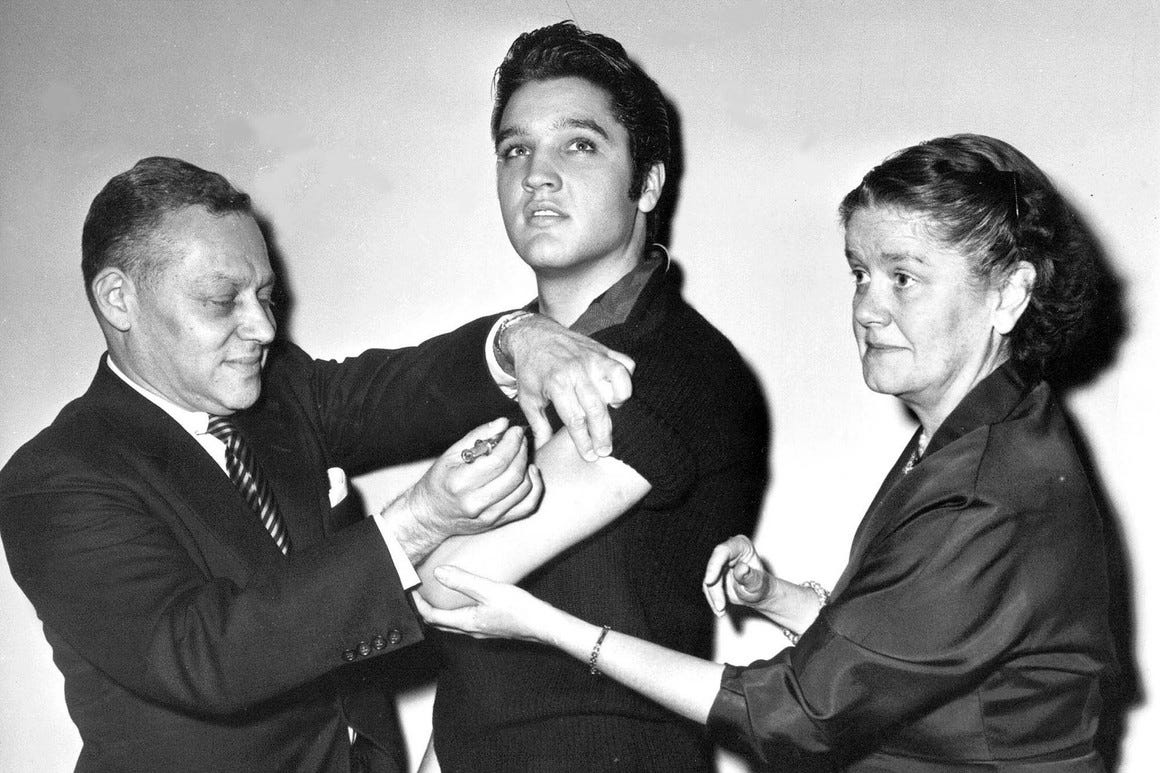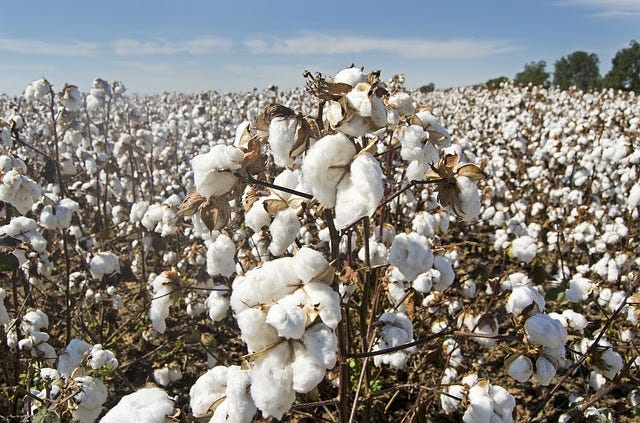Finding vaccine influencers, Pompeo's parting shots, Xinjiang cotton controversy and pandemic tech at CES
11 - 17 January 2021
Hello and welcome!
EVEN VACCINES NEED INFLUENCERS
The global Covid-19 inoculation campaign is gaining momentum as a growing number of countries approve and order doses.
The latest data shows that Israel and the UAE have vaccinated a significantly higher proportion of their populations than the rest of the world. In fact, the UAE's close relationship with China means thousands of Sinopharm doses are available everyday - for free - to all adults, regardless of nationality or profession (in Dubai, the Pfizer/BioNTech vaccine is reserved for priority groups).
Elsewhere, the US is trying to ramp up distribution of its stockpile. 10.6 million injections have been administered across the country, but the figures vary drastically from state to state.
In a bid to expand Operation Warp Speed, the White House revised its guidelines to allow everyone age 65 and older - as well as those with comorbid conditions - to be eligible for the first jab. At the moment, the plan focuses primarily on medical frontline workers and nursing homes. The new thinking is that enough doses will be manufactured and delivered in the three-week gap before the obligatory second jab.
However, more available shots don't necessarily equate to more immunised people. National health authorities have to overcome public distrust, genuine safety concerns and misinformation.
While Joe Biden, Benjamin Netanyahu and Joko Widodo willingly rolled up their sleeves to receive injections on camera, many marketing pros are wondering whether government leaders possess the right star power to persuade others.
So, what's their solution? Celebrities and social media influencers. The idea might sound far-fetched but it's actually an old strategy. One of the most famous examples is Elvis Presley, who endorsed polio inoculation in 1956 and took part in a photo-op.
Can the same be done during the coronavirus pandemic? US health officials are already laying the groundwork, according to Vox's Recode. It reports that various celebs and influencers are being recruited "to promote positive, accurate vaccine content to a wide audience". The Guardian says Britain's NHS is also drawing up a list of "very sensible" personalities to address vaccine scepticism.
Of course, selecting the faces of these initiatives isn't an easy task - the marketers need to match "messenger" to demographic, and assess if they can withstand attacks from anti-vaxxers. Then there's the challenge of crafting material for a range of platforms, from TikTok to newspaper editorials.
Generally, the preference is for elite athletes to come on board given their broad fan bases. Plus getting vaccinated would probably let them compete in the postponed Tokyo Olympics this July. A win-win situation?
POMPEO'S PARTING SHOTS
As Donald Trump prepares for a tumultuous exit from the White House, Mike Pompeo's latest actions seem to be causing just as much stress for Team Biden-Harris.
The outgoing Secretary of State's Twitter feed is currently filled with his 'Greatest Hits', notably his "maximum pressure" stance on Beijing and Tehran. But political pundits have questioned Pompeo's self-proclaimed achievements - one opinion piece in Foreign Policy described his tweets as "a lot of posturing" and an attempt to "bluff his way to a legacy".


Pompeo is having an interesting end to his career as the US's chief diplomat. His final overseas trip - to Belgium and Luxembourg - was cancelled abruptly on Tuesday. Sources told Reuters that EU reps declined to meet him.
At the same time, Pompeo is said to have rushed the State Department impose sanctions on six Chinese officials, and label Cuba and Yemen's Houthi rebels as a state sponsor of terrorism and foreign terrorist organisation, respectively.
The Houthi designation will come into effect on 19 January, a day before Joe Biden's inauguration. It's unclear if the 46th President will immediately reverse the move due to the complicated nature of the six-year conflict. Some members of Congress, Saudi Arabia and the UAE want to "neutralise" the Iran-backed rebels, but the UN and aid agencies claim this particular tactic isn't effective and will hurt thousands of Yemeni civilians.
Save the Children, Oxfam and other charities say they need to deal with both sides in the war-torn country to get food and medicine to Yemeni families. Unless the US grants exemptions, they won't be able to keep important lifelines open, which would exacerbate the devastating famine there.
As for Cuba's return to the list, the Wall Street Journal editorial board is in favour of the decision, but Eurasia Group's Ian Bremmer explains why he isn't convinced in the video below.
COTTON CONTROVERSY
Could the bedsheets you sleep on or the shirt you're wearing be linked to exploited workers in Xinjiang, China? Mounting evidence from human rights campaigners support earlier claims that the CCP has coerced scores of Uighur and Muslim minority citizens in the province to pick and process cotton under harsh conditions.
Anti-Slavery International says survivors of the forced labour system detailed the trauma and punishments they experienced for refusing to toil in the fields or factories.
Now, US and British lawmakers are paying attention to these reports and allegations. Washington and London called on garment and textile companies this week to ensure their supply chains aren't relying on input from Xinjiang's persecuted ethnic groups.
The UK government says it will tighten requirements, encourage better due diligence and introduce fines. However, campaigners want the measures to be tougher to strengthen the 2015 Modern Slavery Act.
Meanwhile, in the US, the authorities will block all imports of cotton (and tomatoes) from Xinjiang. The Trump administration had previously stopped products from individual companies suspected of using abused workers in the region, so this legislation is much more sweeping.
Enforcing these rules will be difficult, though. Xinjiang produces about 80% of China's cotton, which makes up a fifth of the world's stock. As a result, human rights activists believe "virtually the entire apparels industry is tainted".
Brands such as Ikea, H&M and Inditex (owner of Zara and Massimo Dutti) say they have a zero-tolerance approach to improper social practices. The problem is supply chains are incredibly complex. Raw Chinese cotton is often sent to manufacturing hubs in Vietnam, Bangladesh, Mexico etc. and then turned into socks, cushion covers and so on. Therefore, fully tracing the origins is a mammoth undertaking - and, sadly, not many businesses are committed to sustainable and ethical operations
For its part, Beijing strongly denies the forced labour accusations and maintains that the internment camps in Xinjiang are re-education centres.
#CES2021
The world's largest electronics trade exhibition wrapped up on Thursday after a four-day virtual extravaganza.
Usually the CES brings tens of thousands of vendors and buyers to Las Vegas, briefly turning Sin City into a tech mecca. But given the coronavirus emergency, the organisers decided to take the 2021 edition online.
Although the gizmos and digital wizardry weren't as dazzling when viewed on a computer screen, CES still managed to generate buzz around product launches - and include musical performances from Dua Lipa and Billie Eilish.
One theme certainly dominated this year's event - pandemic life. Here are a few examples:
Ubtech Adibot-A - A robot that radiates UVC light to kill germs lingering on surfaces
Kohler Touchless Toilet - Flush your toilet with a wave of your hand
Ettie by Plott - A body temperature-detecting video doorbell
Razer Project Hazel - An N95 respirator model with special UV charging case for disinfection, and a built-in microphone and amplifier to boost the sound of your voice'
Besides healthcare, there were also items catering to our entertainment activities (lots of huge OLED TVs), as well as gimmicky gadgets like LG and TCL's rollable smartphone display and YSL's personal lip colour device.
As always with CES, it's fun to imagine which prototypes will actually make it to stores in the near-future.







